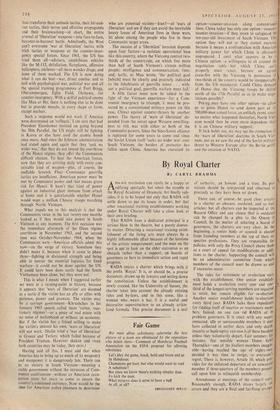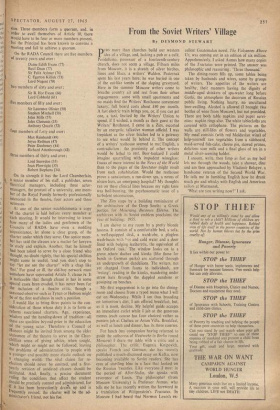By Royal Charter
By CARYL BRAHMS
PAI.ACE revolution can rarely be a happy or
- edifying specthcle, but when the /rouble at the Royal Academy of Dramatic Art finally sub- sides,, it is to be hoped not only that RADA will settle down to put its house in order, but that other vocational training establishments working under Royal Charter will take a close look at their own briefing.
That RADA loses a dedicated principal is a serious blow to the theatre, but a purely domes- tic matter. Directing a vocational training estab- lishment of the living arts must always be a highly inflammable affair because of the tensions of the artistic temperament; and the man on the spot is apt to look on the elder statesman as an obstacle rather than a support, on boards of governors as bars to immediate action and rapid progress.
RADA enjoys a charter which brings with it the prefix 'Royal.' It is, or should be, a precise document, drawn 'up by lawyers and setting down the constitution. Unless the establishment is newly created, like the University of Sussex, the charter takes into account the already existing rules and by-laws, and in this sense, like a woman who, wears a hat, it is a useful and decorative superstructure to an already articu- lated formula. This precise document is a seal
of authority, an honour and a trust, Its pro- visions should be. interpreted and observed a' precisely as they have been set down.
There can, of course,• be good ,clear articles in a charter or obscure, outdated, and so bad. articles; but all charters can be inspected at the Record Office and any clause that is outdated can be changed by a plea to the Queen jil Council. In the matter of selecting a board ol governors, the charters are very clear. In the beginning, a senior body or council is elected from founding members at the top of their re- spective professions. They are responsible for policies, with only the Privy Council above their' as a court of appeal for modifications or addi- tions to the charter. Supporting the council will be an administrative committee from which members of the council must be drawn as, and if vacancies occur.
The rules for retirement or re-election van' with the establishment. One senior establish- ment holds a re-election every year and one' third of the longest-serving members are required to retire, but remain eligible for re-election. Another senior establishment holds re-elections every third year. RADA lacks these expedients for ridding itself of inactive or reactionary meal- bers. Indeed, no one can rid RADA of its problem governors. It is stuck with any super' annuated, idle or unreasonable members it ma" have collected in earlier days, and only death. insanity or bankruptcy can ease it of these burdens unless they voluntarily depart. Last summer, for instance, that sensible woman Dame Sybil Thorndike— one of the liveliest members imagin" able—having reached the age of eighty-two; decided it was time to resign, to everyone' regret. There is, however, Article 10, which pro: vides for the enforced departure of an unwanted member if three-quarters of the members presen call upon him to relinquish membership.
Attendances at meetings of the council vtir Reasonably enough, RADA draws largelyorl actors and they are a fluid and far-flung prok"'
Sion. Three members form a quorum, and, in order to avail themselves of Article 10, there would have to be four or more members present, but the Principal has been known to convene a meeting and fail to achieve a quorum.
On the RADA Council there are five members of seventy years and over:
Dame Edith Evans (77) - Basil Dean (77)
Sir Felix Aylmer (76) C. Egerton Killick (73) Lord Nugent (70)
two members of sixty and over:
Sir B. Ifor Evans (66) Lord Cobbold (61)
five members of fifty and over: Sir Laurence Olivier (58) Stephen Mitchell (58) John Mills (57) John Clements (55) Anthony Quayle (52) four members of forty and over: . Max Reinhardt (49) Joyce Redman (47) Peter Daubeney (44) Richard Attenborough (42) three members of thirty and over: Lord Snowdon (35) Joan Plowright (35) Robert Stephens (34).
On its strength it has the Lord Chamberlain, a senior member of his staff, a publisher, seven theatrical managers, including three actor- managers, the provost of a university, one mem- ber of the Royal Family formerly professionally interested in the theatre, four actors and three actresses.
At one of the senior establishments a copy of the charter is laid before every member at each meeting. It would be interesting to know how many of the ladies and gentlemen of the Councils of RADA have even a nodding acquaintance, let alone a clear grasp, of the charter under which they serve. One senior mem- ber has said the clauses are a matter for lawyers to study and explain. Another, that he himself had been asked to serve by a close friend who thought, no doubt rightly, that his special abilities might come in useful, 'and you don't stop to saY "let me see the charter" with a chap like that.' For good or ill, the old-boy network must somehow have superseded Article 5, clause iv. It is noticeable that though clause iv has in some special cases been evaded, it has never been for the inclusion of a theatre critic, though a seasoned observer such as Tynan or Hobson might be of the first usefulness in such a position.
would like to bring three points to the con- sideration of those whose duty it is to form or reform vocational charters. Age, experience, wisdom and the handing-down of tradition—all these are qualities beyond price in the education of the young actor. Therefore a Council of Honour might be invited from among the elder statesmen of the theatre to serve in the Chur- ehillian sense of giving advice, when sought, which might or might not be followed, leaving the problems of administration to people with a younger and possibly more elastic outlook on a changing world. The vital clause for re- election should never be omitted, and a five- Yearly revision of outdated clauses should be Instituted. And, finally, a precise document ruling the conditions that affect the student should be precisely conned and administered, for if it has been benevolently drain up and is frequently revised, the charter will be the ad- ministrator's friend, not his foe.































 Previous page
Previous page